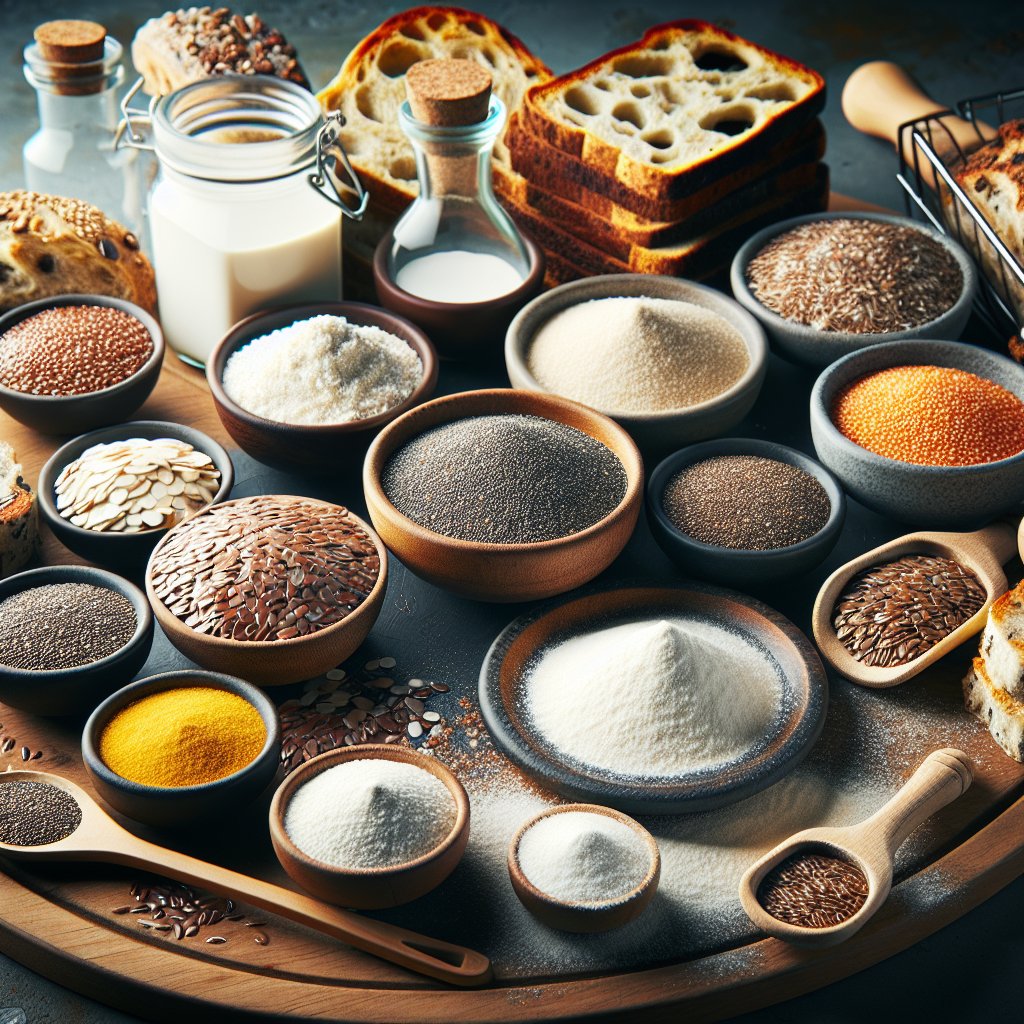Discover the Top Psyllium Husk Substitutes for Keto – Revolutionize Your Low-Carb Cooking!
Discover the Top Psyllium Husk Substitutes for Keto – Revolutionize Your Low-Carb Cooking!
Welcome to our latest article dedicated to transforming your keto cooking experience by exploring the world of psyllium husk substitutes. If you’re committed to the ketogenic lifestyle, you know how crucial psyllium husk is in low-carb recipes. It’s not just a mere ingredient; it’s a game-changer!
The Importance of Psyllium Husk in Keto Recipes
Psyllium husk is a keto superstar for a reason. It’s packed with fiber, and as you know, fiber is essential for digestive health. Psyllium husk has been scientifically proven to help with cholesterol levels, promote a feeling of fullness, and aid in stabilizing blood sugar levels. Plus, it’s a fantastic binding agent, perfect for low-carb baking and cooking. However, we know that sometimes it might be challenging to get your hands on psyllium husk.
Don’t worry! We’ve got you covered. In this article, we’ll explore some incredible psyllium husk substitutes that will keep you cooking up a storm while staying true to your keto goals.

Benefits of Psyllium Husk in Keto Diet
Psyllium husk is a versatile and essential ingredient in low-carb baking for keto enthusiasts. Not only does it act as a binding agent and add moisture to baked goods, but it also offers a plethora of health benefits. Research has shown that psyllium husk can aid in digestion, promote gut health, and contribute to weight management on a ketogenic diet.
Psyllium husk is rich in soluble fiber, which can help regulate bowel movements and alleviate constipation, a common issue when initially adapting to a low-carb lifestyle. Furthermore, its gel-like properties can provide a feeling of fullness, potentially reducing overall calorie intake and supporting weight loss efforts. Its ability to improve lipid and glucose levels also makes it an excellent choice for enhancing overall metabolic health.
Popular Psyllium Husk Substitutes for Keto
If you’re following a keto lifestyle, you know the significance of psyllium husk in low-carb cooking. But what if you run out of it? No worries, we’ve got you covered with some fantastic alternatives:
1. Flaxseed Meal
Flaxseed meal, a fiber-rich and low-carb option, can be an excellent substitute for psyllium husk in keto recipes. It’s packed with omega-3 fatty acids, making it a nutritious choice for your baked goods and as a thickening agent in soups and stews.
2. Chia Seeds
Chia seeds are another versatile alternative. They are high in fiber and can absorb a considerable amount of liquid, giving your dishes the right texture. Use them to replace psyllium husk in recipes like keto bread or as a binding agent in burgers and meatballs.
3. Xanthan Gum
Xanthan gum is a keto-friendly thickening agent that can work as a substitute for psyllium husk in baking. It’s known for its ability to mimic the texture of gluten, making it perfect for low-carb and gluten-free recipes. Just a small amount can go a long way in improving the texture of your keto-friendly baked goods.
Nutritional Comparison: Psyllium Husk and Its Substitutes
When it comes to the ketogenic diet, understanding the nutritional value of psyllium husk and its substitutes is crucial for maintaining the right macros. Psyllium husk is a great source of soluble fiber, with 52 grams of carbs, 1 gram of fat, and 9 grams of protein per 100 grams. On the other hand, flaxseed meal, a popular substitute, contains 2 grams of net carbs, 42 grams of fat, and 19 grams of protein per 100 grams. Almond flour, another substitute, has 8 grams of net carbs, 55 grams of fat, and 21 grams of protein per 100 grams.
Usage and Ratios
When using psyllium husk substitutes in your keto recipes, it’s important to understand the proper ratios to ensure the best results. Psyllium husk is often used as a binding agent and to add a bread-like texture to low-carb baked goods. However, if you need to substitute it, there are several alternatives that work well.
One popular substitute is ground flaxseeds. For every tablespoon of psyllium husk, you can use the same amount of ground flaxseeds. Another excellent option is chia seeds, and you’ll want to use the same substitution ratio as with ground flaxseeds – one tablespoon of chia seeds for every tablespoon of psyllium husk. It’s crucial to remember that both flaxseeds and chia seeds have a tendency to absorb moisture, so you may need to adjust the liquid content of your recipe accordingly.

Recipe Ideas using Substitutes
Are you tired of the same old keto-friendly bread, wraps, and desserts? It’s time to get creative in the kitchen with innovative psyllium husk substitutes! Psyllium husk is a common ingredient in low-carb baking, but if you’re looking for alternatives, you’re in the right place. Let’s revolutionize your low-carb cooking with these amazing recipe ideas using psyllium husk replacements.
One fantastic substitute for psyllium husk is ground flaxseeds. They are rich in fiber and healthy fats, making them a perfect option for keto baking. Try using ground flaxseeds in your next bread or dessert recipe for a nutritious twist.
Another excellent substitute is chia seeds. When mixed with water, chia seeds create a gel-like consistency, similar to psyllium husk. This makes them a great binding agent for keto-friendly wraps and desserts.
For a nutty flavor and added texture, almond flour is an exceptional substitute for psyllium husk. It’s low in carbs and high in protein, making it an ideal choice for those following a ketogenic lifestyle.
These innovative substitutes will not only elevate the taste of your keto creations but also add a nutritional boost to your diet. Get ready to impress your taste buds and nourish your body with these psyllium husk replacements!
Offering Tips and Tricks for Successful Baking with Alternative Ingredients
When it comes to baking on a keto diet, using alternative ingredients can be a game-changer. Psyllium husk is a fantastic option, but there are also other substitutes that can achieve similar results. To ensure success, here are some top tips and tricks when baking with substitutes:
- Understand the purpose of the original ingredient – for example, psyllium husk’s binding and moisture-retaining properties.
- Use substitutes like ground flaxseed, chia seeds, or xanthan gum, which offer similar binding abilities.
- Adjust the level of moisture in your recipe when using substitutes, as they may require more or less liquid than psyllium husk.
- Experiment with different ratios to achieve the desired texture and taste.
- Be patient and persistent – successful baking often involves some trial and error.
Using these tips, you can master the art of baking with psyllium husk substitutes, creating delicious keto-friendly treats with the perfect texture and taste.
Expert Advice and Recommendations
When it comes to incorporating psyllium husk substitutes in a low-carb diet, getting insights from nutritionists or keto experts is invaluable. According to keto experts, psyllium husk can be a fantastic addition to a low-carb diet due to its high fiber content, which can help with digestive health and promote a feeling of fullness. When looking for substitutes, it’s essential to seek alternatives that are also low in carbs and high in fiber. Nutritionists often recommend chia seeds, ground flaxseeds, and coconut flour as excellent replacements for psyllium husk in keto recipes due to their similar nutritional profiles and binding properties.
Experimenting with Psyllium Husk Substitutes for Keto
As we’ve discussed, psyllium husk is a fantastic ingredient in keto cooking, but there are times when you may need to find a suitable replacement. Throughout this article, we’ve delved into various substitutes like chia seeds, flaxseed meal, and xanthan gum, all of which offer their own unique benefits in low-carb and keto recipes. It’s important to remember that each substitute may behave differently in recipes, so don’t be afraid to experiment with different options to discover what works best for you and your favorite dishes.
By embracing experimentation, you’ll not only revolutionize your low-carb cooking but also open the door to a world of creativity and flavor in your keto kitchen. So go ahead, try out different psyllium husk substitutes and let your culinary adventures begin!


